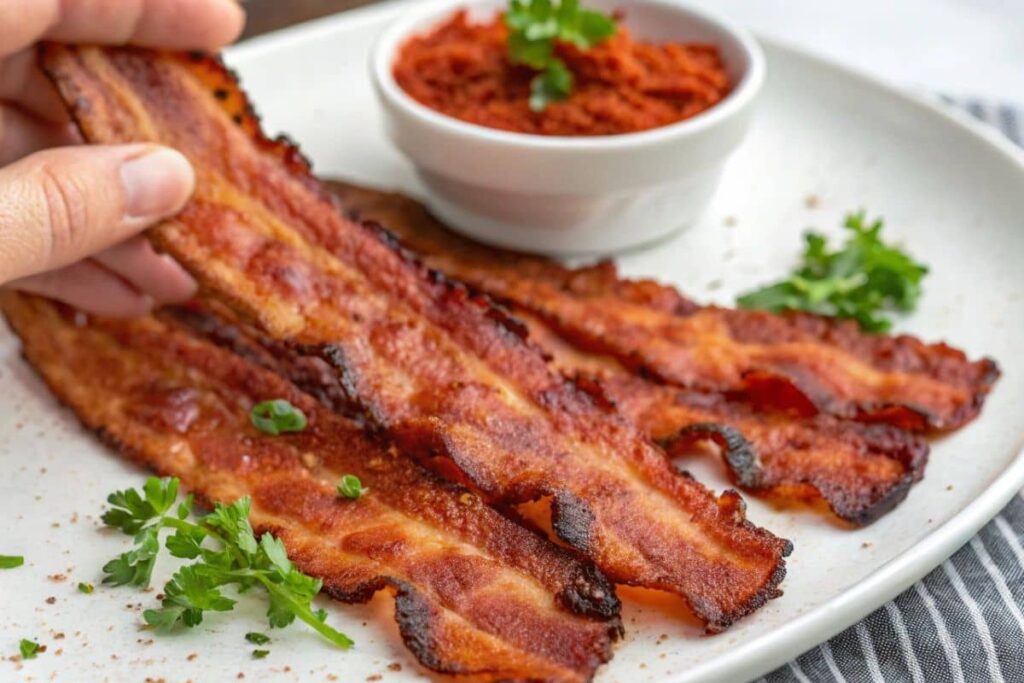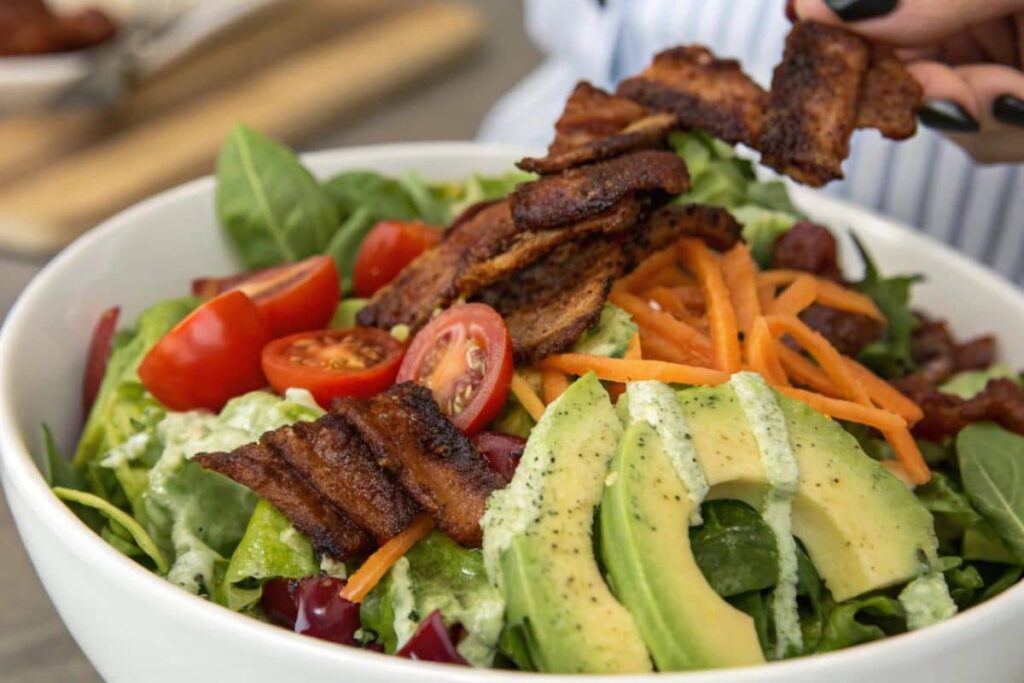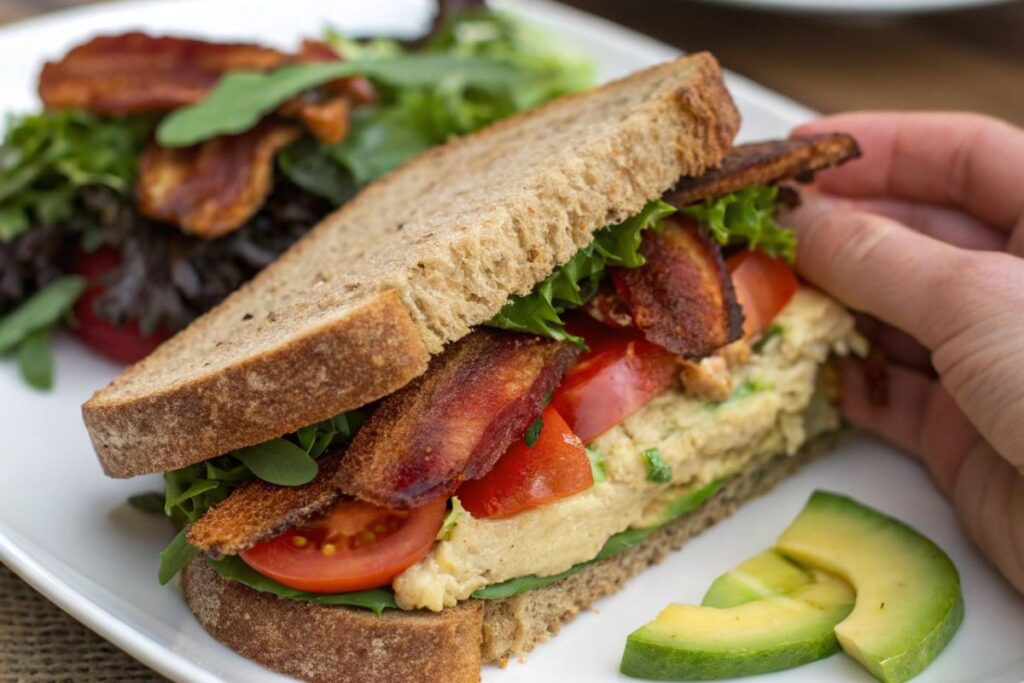Is beef bacon unhealthy? That’s a question many people ask as this smoky, crunchy, and flavorful treat gains popularity in kitchens worldwide. While it’s a delicious addition to many dishes, its impact on health is worth exploring. If you’ve ever wondered about the balance between indulging in its savory goodness and maintaining a healthy lifestyle, you’re in the right place. Let’s uncover the facts about beef bacon, its nutritional profile, and tips to enjoy it in a smarter, healthier way. Ready to dig in?
Table of Contents

The Growing Popularity of Beef Bacon
What Is Beef Bacon?
Let’s set the record straight. Beef bacon is crafted from beef, often sourced from the belly, brisket, or other flavorful cuts. Through a process of curing, seasoning, and smoking, it’s transformed into a savory delight with its own unique twist on the classic bacon taste.
With a heartier texture and a distinct flavor, beef bacon stands out as a delicious alternative. Whether you’re crisping it up for a morning feast or adding it to your favorite dishes, it’s a treat that’s hard to resist. 😋 But with its rich, indulgent taste, some may wonder: Is beef bacon unhealthy?
Why Choose Beef Bacon?
Many people opt for beef bacon for a variety of reasons. Some are drawn to its distinctive flavor, while others choose it to align with dietary preferences or religious practices. But the real question is: Is beef bacon unhealthy?
As a flavorful alternative to traditional pork bacon, beef bacon certainly has its appeal. However, like all cured meats, it’s important to consider its nutritional impact. That said, its smoky, crispy allure is what keeps us coming back for more.
The Appeal of Beef Bacon: Taste and Versatility
What sets beef bacon apart? Its versatility is unmatched! From being the star ingredient in sandwiches and wraps to adding a crunchy twist to salads and baked potatoes, it shines in countless dishes.
But again, is beef bacon unhealthy? The answer depends on how it’s prepared and consumed. When enjoyed in moderation, its bold, smoky flavor can elevate both sweet and savory creations. Picture crispy beef bacon wrapped around juicy dates or scattered over creamy mac and cheese. Delicious, right?
Nutritional Facts About Beef Bacon
So, just how healthy—or not—is beef bacon? To figure that out, let’s take a closer look at its nutritional breakdown. Spoiler: it’s a blend of both benefits and drawbacks. Here’s a quick snapshot of what you’re biting into when you enjoy that crispy, flavorful strip.
| Nutrient | Amount (Per 1 Slice) |
|---|---|
| Calories | 42 kcal |
| Protein | 3 grams |
| Fat | 3.5 grams |
| Saturated Fat | 1.2 grams |
| Sodium | 190 mg |
| Carbohydrates | 0 grams |
Key Ingredients and Preservatives in Beef Bacon
Beef bacon is made using simple yet impactful ingredients: beef, salt, sugar, and curing agents like sodium nitrate or celery powder (a natural alternative). These components are essential for its signature smoky flavor and extended shelf life.
However, some may ask, is beef bacon unhealthy? Certain preservatives have raised health concerns, particularly when consumed in large amounts. While beef bacon is a delicious choice, it’s always best to enjoy it in moderation and be mindful of its nutritional impact.
Don’t worry—we’ll dive deeper into that in a bit.
Sodium Levels: A Closer Look
Sodium is a double-edged sword—it’s essential for maintaining fluid balance and nerve function, but excess amounts can spell trouble. With around 190 mg of sodium in just one slice of beef bacon, it’s easy to go overboard, especially if you’re enjoying multiple slices.
This leads to an important question: Is beef bacon unhealthy? While it’s undeniably flavorful and satisfying, consuming too much sodium can contribute to high blood pressure and other health concerns. That’s why keeping an eye on portion sizes is crucial to avoid potential risks while still savoring its delicious smoky taste.
Balancing indulgence with mindful consumption is key—so enjoy beef bacon in moderation!
Is Beef Bacon Unhealthy? A Detailed Analysis
Now, the big question: Is beef bacon unhealthy? The truth isn’t so simple—it all comes down to portion sizes, cooking methods, and your overall diet. Beef bacon can be part of a balanced lifestyle if consumed thoughtfully. Let’s dive into the key health considerations to help you make an informed choice.
Potential Health Concerns of Eating Beef Bacon
High Saturated Fat Content
Beef bacon contains a significant amount of saturated fat, which can elevate LDL (bad cholesterol) levels, potentially leading to an increased risk of heart disease over time. However, there’s no need to stress—enjoying it occasionally and in moderation is unlikely to cause any major harm. Balance is everything!
“It’s not about eliminating beef bacon entirely; it’s about enjoying it responsibly.”
Sodium and Its Effects on Health
Sodium is a point worth emphasizing. Excessive intake can lead to bloating, high blood pressure, and even strain on your kidneys. If your diet is already high in salty foods, adding beef bacon could push you over the limit. To enjoy it more responsibly, consider choosing low-sodium options or reducing your portions. Your body will thank you!
Processed Meat and Long-Term Health Risks
Like many processed meats, beef bacon has been associated with potential health risks, including a higher chance of certain cancers. This link is often attributed to the curing agents, such as nitrates, used to preserve and flavor the meat. While research continues to explore these connections, enjoying beef bacon occasionally and in moderation can help minimize potential risks.
Common Issues Related to Beef Bacon
Overconsumption and Its Impact on Health
It’s no secret—beef bacon is hard to resist, and stopping at just one or two slices can feel impossible. However, overindulging can quickly pile on calories, fat, and sodium, potentially leading to weight gain, elevated cholesterol, and other health concerns. Moderation is the secret to enjoying its delicious flavor without compromising your well-being.
Processed Beef Bacon: Understanding the Risks
Processed meats often carry a less-than-stellar reputation, and it’s not without reason. The curing process, while enhancing flavor and extending shelf life, often involves chemicals that might not be ideal for frequent consumption.
This raises an important question: Is beef bacon unhealthy? While it’s a tasty alternative to traditional pork bacon, its processing methods can contribute to health concerns if consumed excessively.
Opting for natural or minimally processed alternatives is a smarter choice to help lower potential health risks while still enjoying the delicious smoky flavors of beef bacon. Making informed decisions about your diet ensures you get the best of both worlds—great taste and better health!
How to Make Beef Bacon Healthier
Great news—you don’t need to say goodbye to beef bacon to maintain a healthy lifestyle! But let’s be honest: is beef bacon unhealthy? It all depends on how it’s prepared and consumed. By making a few thoughtful choices, you can savor its deliciousness without the guilt. Here are some simple tips to enjoy beef bacon in a way that’s kinder to your body.
Opt for Low-Sodium or Nitrate-Free Varieties
Choose beef bacon labeled as “low-sodium” or “nitrate-free” to minimize your intake of harmful preservatives and excess salt. Since high sodium and nitrates are often linked to health risks, is beef bacon unhealthy? Not necessarily—opting for natural curing methods makes a significant difference. It’s a small change that can have a big impact on your well-being!
Make Homemade Beef Bacon for Better Control
Feeling adventurous? Try making your own beef bacon! This gives you full control over the ingredients—just use quality beef, natural curing salt, and your favorite spices.
Plus, homemade bacon is free of unnecessary additives and delivers a fresher, more flavorful taste than store-bought options. So, instead of asking, “Is beef bacon unhealthy?”, you’ll be saying, “My homemade version is a healthier, tastier choice!”
Quick Recipes for Homemade Beef Bacon

Salad with Beef Bacon
| Ingredient | Quantity |
|---|---|
| Mixed greens (spinach, kale, arugula) | 2 cups |
| Cherry tomatoes | 1/2 cup |
| Cucumber (sliced) | 1/2 cup |
| Cooked beef bacon (crumbled) | 2 slices |
| Avocado (diced) | 1/4 cup |
| Balsamic vinaigrette | 2 tbsp |
Instructions: Combine fresh greens, cherry tomatoes, crisp cucumber, and creamy avocado in a bowl. Sprinkle crumbled beef bacon on top and finish with a drizzle of tangy balsamic vinaigrette. This vibrant, nutrient-packed salad delivers a delightful smoky and savory twist.

Healthy Sandwich with Beef Bacon
| Ingredient | Quantity |
|---|---|
| Whole-grain bread (toasted) | 2 slices |
| Cooked beef bacon | 2 slices |
| Avocado (mashed) | 1/4 cup |
| Leaf lettuce | 1-2 leaves |
| Tomato slices | 2-3 slices |
| Mustard or low-fat mayo | 1 tsp |
Instructions: Spread mashed avocado on one slice of toasted bread. Add lettuce, tomato, and beef bacon. Spread mustard or mayo on the other slice, then assemble the sandwich. It’s a hearty, healthy option perfect for lunch or a quick snack! 🥪
Classic Homemade Beef Bacon
| Ingredient | Quantity |
|---|---|
| Beef brisket or belly | 1 lb |
| Salt | 2 tbsp |
| Brown sugar | 1 tbsp |
| Black pepper | 1 tsp |
| Smoked paprika | 1 tsp |
Instructions: Rub the spices and sugar all over the beef. Place it in a sealed container and let it cure in the refrigerator for 3-5 days. After curing, rinse the beef and pat it dry. Bake at 200°F (95°C) or smoke it until fully cooked and crispy. Slice and enjoy! 🥓
Honey-Glazed Beef Bacon
| Ingredient | Quantity |
|---|---|
| Beef brisket or belly | 1 lb |
| Honey | 2 tbsp |
| Salt | 1 tbsp |
| Garlic powder | 1 tsp |
| Black pepper | 1 tsp |
Instructions: Mix honey, salt, garlic powder, and black pepper. Rub this mixture generously on the beef. Allow it to cure in the refrigerator for 2-3 days. Bake at 225°F (110°C) until crispy, flipping halfway through for even caramelization. Sweet, savory perfection! 🍯
Spicy Beef Bacon
| Ingredient | Quantity |
|---|---|
| Beef brisket or belly | 1 lb |
| Salt | 2 tbsp |
| Red chili flakes | 1 tsp |
| Cayenne pepper | 1/2 tsp |
| Garlic powder | 1 tsp |
| Smoked paprika | 1 tsp |
Instructions: Combine salt, chili flakes, cayenne pepper, garlic powder, and smoked paprika. Rub this spice mix all over the beef. Cure in the refrigerator for 3-4 days. Cook it in the oven at 225°F (110°C) or smoke it until crispy. Perfect for those who love a kick of heat! 🌶️🔥
Combine Beef Bacon with Nutrient-Dense Foods
Balance your beef bacon indulgence with nutrient-rich sides like leafy greens, creamy avocado, or hearty whole-grain bread. These additions provide fiber, vitamins, and healthy fats, turning your meal into a well-rounded delight. It’s all about creating harmony on your plate—like a delicious yin-yang effect. 🥗✨
Alternatives to Traditional Beef Bacon
If you’re ready to explore, there are plenty of alternatives to traditional beef bacon that might just win you over. From turkey bacon to plant-based options, these choices offer satisfying flavors with fewer health concerns. But before making the switch, let’s consider: is beef bacon unhealthy? While moderation is key, trying new options can be both fun and beneficial for your health. Why not give them a try? You might be pleasantly surprised!
Exploring Healthier Cuts of Beef for Bacon
For a healthier twist, try using leaner cuts of beef like sirloin or tenderloin as a substitute for traditional beef bacon. With the right seasoning and cooking technique, you can achieve a similar smoky flavor while cutting down on fat. So, is beef bacon unhealthy? Not necessarily—choosing leaner cuts makes a big difference. It’s a win-win for your taste buds and your health!
Plant-Based Options: A Creative Twist
Plant-based “bacon” crafted from ingredients like mushrooms, tempeh, or coconut is becoming a favorite among health-conscious food lovers. These alternatives are lower in fat, free from preservatives, and packed with unique flavors.
For those wondering, “Is beef bacon unhealthy?”, plant-based options provide a nutritious alternative that still delivers delicious smoky goodness. Plus, they’re a fun way to explore new textures while adding variety to your diet.
Comparing Beef Bacon to Other Protein Sources
Beef bacon does offer a decent protein boost, but if health takes center stage, lean options like grilled chicken or fish are excellent alternatives. These choices are lower in fat and sodium while delivering a rich supply of essential nutrients. So, is beef bacon unhealthy in comparison? Not if you balance your intake with other high-protein, nutrient-dense foods.
Tips for Moderating Beef Bacon Consumption
You don’t have to give up beef bacon entirely—life’s too short to skip the foods you love! Instead, embrace moderation. Here are some practical tips to enjoy beef bacon responsibly without overindulging.
How to Incorporate Beef Bacon in a Balanced Diet
Beef bacon doesn’t always need to take center stage on your plate. Instead, use it as a garnish or flavor enhancer. Try crumbling a slice into a fresh salad or mixing it into scrambled eggs for a burst of smoky goodness without overloading your meal. This way, you get the taste without excess fat or sodium.
Practical Portion Control Tips
Limit yourself to one or two slices per serving to keep your calorie and sodium intake in check. So, is beef bacon unhealthy? Not if you enjoy it in moderation! The key is savoring the rich flavor while keeping portions reasonable. After all, it’s about quality, not quantity.
Healthy Cooking Techniques for Beef Bacon
Opt for baking or grilling instead of frying your beef bacon. These cooking methods help reduce the amount of fat absorbed, resulting in a lighter, less greasy slice.
And the best part? You still get that irresistible crispiness—without the extra guilt! Now, is beef bacon unhealthy? Not when you cook it the right way!
Frequently Asked Questions About Beef Bacon
Is Beef Bacon Suitable for a Healthy Diet?
Yes, if consumed in moderation and paired with nutrient-rich foods. It’s all about balance.
Can Beef Bacon Be Part of a Weight Management Plan?
Absolutely! Stick to portion control and pair it with low-calorie, high-fiber foods to keep you feeling full without going overboard.
What Are the Best Ways to Cook Beef Bacon?
Baking and grilling are top choices for healthier beef bacon. They’re easy, mess-free, and minimize fat content.
Conclusion: Making Smart Choices with Beef Bacon
Beef bacon doesn’t need to be a guilty indulgence. With thoughtful choices and a touch of creativity, it can easily complement a balanced diet. Whether you’re savoring homemade slices or choosing nitrate-free varieties, moderation is the ultimate secret. So go ahead—treat yourself to that crispy, smoky delight with confidence. Your taste buds and your body will thank you! 🥓✨
In the end, beef bacon can absolutely fit into a healthy lifestyle when enjoyed mindfully. Pair it with nutrient-rich foods, choose healthier cooking methods, and practice portion control.
Now that you know how to enjoy beef bacon responsibly and even make it at home, why not take it to the next level? Learn the best techniques for cooking beef bacon to bring out its irresistible flavor. Want to get fancy? Try wrapping tender cuts of meat with bacon—check out how to cook bacon-wrapped beef filet for an elegant dish that’s perfect for special occasions. Feeling adventurous? Pair the savory richness of beef bacon with seafood by exploring beef bacon and salmon roe recipes. Your culinary possibilities are endless!

Homemade Beef Bacon
Ingredients
Main Ingredients
- 1 lb Beef brisket or belly Use quality beef for best results.
- 2 tbsp Salt Essential for curing.
- 1 tbsp Brown sugar Balances the flavor.
- 1 tsp Black pepper For seasoning.
- 1 tsp Smoked paprika Enhances the smoky flavor.
Instructions
Preparation
- Rub the spices and sugar all over the beef.
- Place it in a sealed container and let it cure in the refrigerator for 3-5 days.
Cooking
- After curing, rinse the beef and pat it dry.
- Bake at 200°F (95°C) or smoke it until fully cooked and crispy.
- Slice and enjoy your homemade beef bacon.





